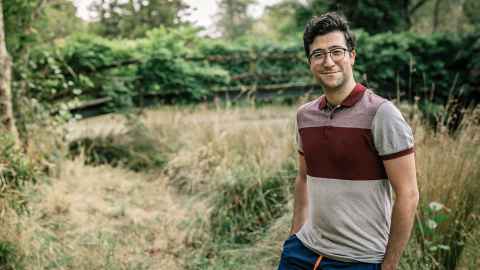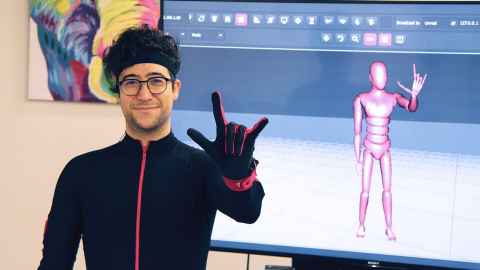Arash Tayebi – ‘Awareness is king’
Dr Arash Tayebi, who is deaf in one ear and has dyslexia, was recognised as one of the University’s top young disruptors and innovators in its “40 under 40” awards 2020.

Dr Aresh Tayebi's recognition in the University's "40 Under 40" awards came for creating Niki, a digital avatar who translates content into sign language.
Arash founded Kara Technologies, with two other University of Auckland alumni, to use Niki commercially, thanks to winning the 2017 Velocity $100k social category prize.
“We’d like to make sign language part of the norm for accessibility,” says Arash who has experienced increasing hearing loss himself.
“I personally believe services such as arts, banks, health, education etc should be available in the Deaf community’s first language.”
Arash studied engineering in his native country, Iran, and then did his masters in Melbourne, before arriving in New Zealand in 2013 to study for his PhD.
So far, the team at Kara have translated a number of children’s books into New Zealand Sign Language (NZSL).
Kara also created a Covid-19 self-checker in NZSL and American Sign Language. Kara has also completed several projects internationally.
“While there are text emergency messages in NZ (the Text111 service), for the Deaf community, English often is their second language; can you imagine making emergency communications accessible in sign language?”

To create Niki, Kara Technology uses motion capture and the powerful Unreal Engine’s 3D game software, something overseas companies have tried to do without success.
“Sign language heavily relies on facial expression,” says Arash, “and this was really missing from the other avatars, which were made for movies or kids’ cartoons.”
Arash is proud the team has included the Deaf community’s views during design stages and concepts.
“We are very fortunate to have experts in our team, including on Sign Language and the Deaf Community,” he says. “That’s something I’m very, very proud of.”
Arash credits the University for giving him the skills and confidence to take the leap into the business arena.
“The practical aspects, people, money, objectives and obstacles and how to overcome them – and how to be bold and work towards a goal, these are things I learned from the University of Auckland through different workshops and mentorship.”
Arash is also grateful to the Equity Office’s Student Disability Services for suggesting he is very likely to have dyslexia.
Once he knew more about dyslexia, Arash gained confidence about his doctorate. Formerly, his difficulties with spelling had undermined his belief in his own intelligence.
He also understood when he needed to ask for assistance, for example, writing business proposals.
The turning point was being aware, as, he says, “awareness is king”.
Arash may have arrived in New Zealand thinking there would be sheep at the airport (“in my defence, Wikipedia says population four million, population of sheep, 32 million!”), but he has thrived since.
Arash says there is a strong sense of community in New Zealand and Kara wants to take that concept of community to the world.
“We are working on New Zealand Sign Language, but we have plans for International Sign language, American Sign Language, British Sign Language, Iranian Sign Language, oh any country’s Sign Language – why not!”